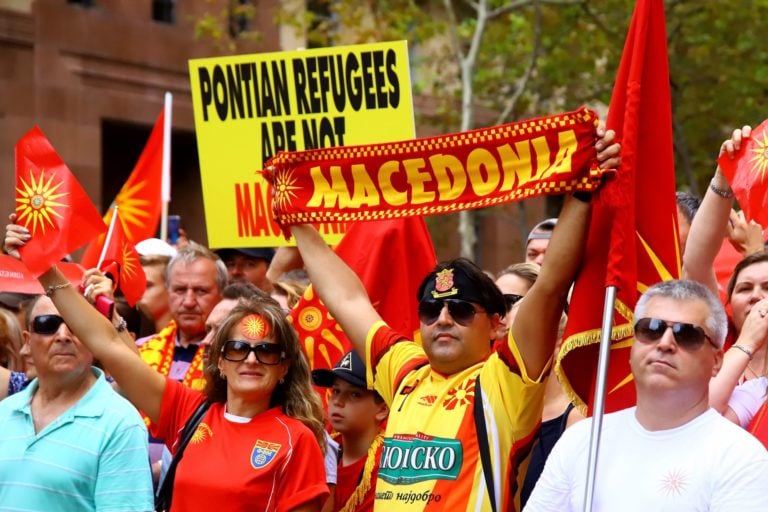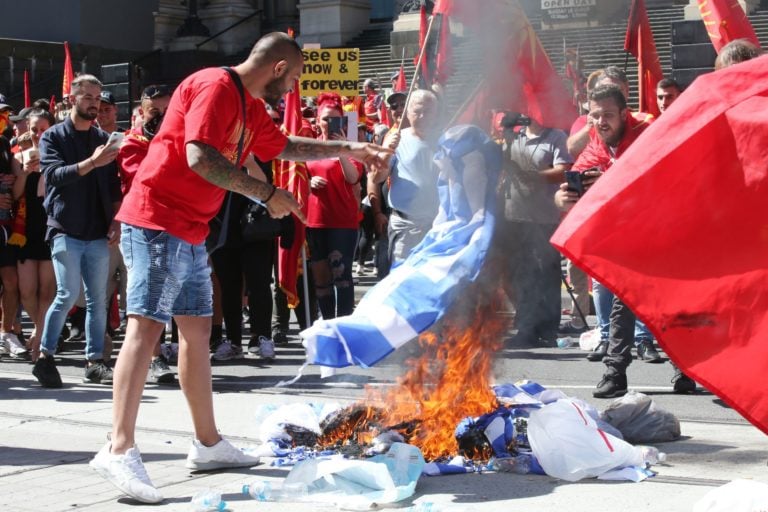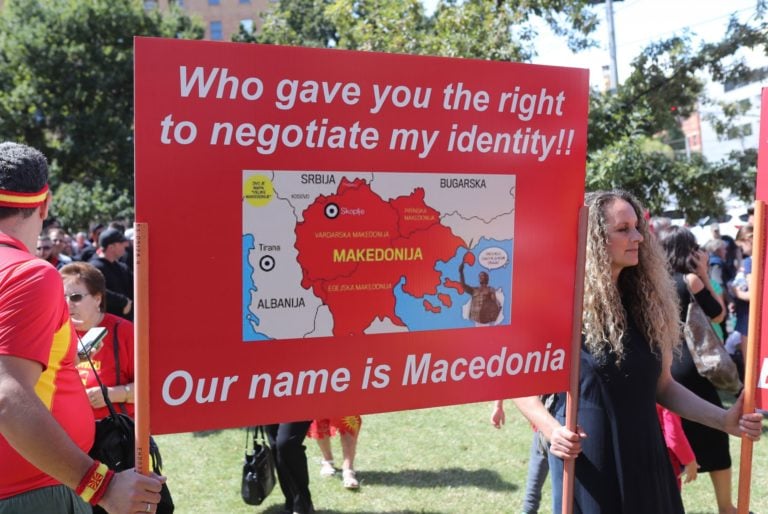The geographical area of Macedonia is primarily split between three countries, namely Greece, the ‘Former Yugoslav Republic of Macedonia’ (hereafter FYROM), and Bulgaria. Although home to distinct peoples, within each subregion the population identifies as Macedonian.
For example, in northern Greece people regard themselves to be both Macedonian and Greek, in a cultural and historical sense, in the same way Greeks in Crete regard themselves as both Cretan and Greek. The usage of the term is pervasive in northern Greece with an airport, newspaper, television network and university, among the institutions bearing the name ‘Macedonia’.
Recent developments have seen FYROM and Greece re-enter negotiations over the naming issue. Greece’s official position for the past couple of decades is one of compromise. In particular, Greece proposes that the name FYROM be replaced by a compound name with a geographical qualifier before the word ‘Macedonia’, to be recognised by all countries and for all purposes whether internal or international. In this way, Greece does not wish to undermine the sovereignty of its neighbour but instead seeks to protect its own sovereignty, identity and cultural heritage.

The present article challenges the false, albeit fairly common view that casts Greece as an obstinate aggressor and FYROM as an underdog and a victim. Instead, we argue that FYROM has been a victim of its own aggression, which has undermined the stability of the country and its prospects for further integration with Europe.
Why is Macedonia Contested?
There is a consensus amongst modern scholars and historians that the ancient Kingdom of Macedonia belonged to the Greek world: prominent ancient Macedonians, including Alexander the Great and his father Phillip, self-identified as Greeks, a Greek dialect was spoken, Greek Gods were worshipped and ancient Macedonians participated in the Olympic Games, which were restricted to Greeks only.
This kingdom lay exclusively within the borders of the modern Greek state and for this reason all prominent ancient archaeological Macedonian sites are located in Greece, including Alexander’s birthplace and site of his father’s tomb Aigai, the city of Mieza where Alexander was tutored by Aristotle, and Dion, where Alexander worshipped the Twelve Gods of the Olympian canon with all other ancient Greeks.
Subsequent to the Roman conquest of Macedonia in 168BCE, the administrative boundaries of what became the Roman province of Macedonia expanded to the north and west. Over time different ethnic and linguistic groups came to populate this broader region, including Slavic peoples in the 6th century CE. The region has remained a diverse one ever since. For most of the duration of Ottoman rule in the Balkans, identity had more religious rather than national character. Therefore, it is not surprising that during this time the usage of the term Macedonian had a purely geographical connotation , similar to a ‘Northerner’ in England or to ‘Mid-Westerner’ in the United States.
In the 1800s, an awakening of national consciousness took place among Greeks, Serbs and Bulgarians, each establishing a state that became either independent or autonomous from the Ottoman Empire. In Macedonia, which remained under Ottoman rule, local Greek and Slavic populations began to agitate for independence from the Turks and integration with their respective national centres.
There was at this stage no ‘Macedonian’ national consciousness amongst the Slavic peoples of what would become FYROM.
As a result the area became contested between the three new states and during the Balkan Wars 1912-13, each of these countries gained a portion of new territory.
During the first half of the 20th century, in so far as the Slavs of Macedonia had developed a national identity, it was predominantly a Bulgarian one that had been encouraged by the actions of the Bulgarian Orthodox Church (the then Bulgarian Exarchate), although they were aware of differences among themselves and the inhabitants of Bulgaria.
On the other hand, according to Jovan Cvijić, a well-known geographer of the Balkans who essentially articulated the Serbian position on the matter, the Slavs of Macedonia (whom he called ‘Macedo-Slavs’) were a transitional group, located culturally and linguistically between the Bulgarians and Serbs.
According to Wilkinson, “the Macedo-Slavs, whatever might have been their origins, had arrived at a state of national development when identification with either the Serbs or Bulgarians was no longer possible in theory or in practice”.
In 1946, the part of Macedonia within Serbia was incorporated as a constituent republic in Tito’s Yugoslav federation under the name ‘People’s Republic of Macedonia’. The recognition of the existence of a separate ‘Macedonian nation’ by the Communist Party of Yugoslavia served two purposes: to eliminate the sense of Bulgarian national identity shared by many inhabitants of the area, and hence to gain control and eventually justify retaining it as part of the Yugoslav federation; and the desire to extend Yugoslav control over Bulgarian and Greek Macedonia as well.
When the Yugoslav Federation began to dissolve in the early 1990s, the southernmost part declared independence and sought recognition under the name ‘Republic of Macedonia’.
Nationalism threatens FYROM’s Neighbours
The dissolution of Yugoslavia represented a significant change to the status quo in the southern Balkans, as a newly independent FYROM claimed the name Macedonia exclusively for itself as a sovereign state, as opposed to a member of a federation. In this context, the maximalist name ‘Republic of Macedonia’ was not simply an expression of sovereignty but also a threat to the stability of the region.
This becomes clearer when combined with other actions that were taken by the new republic, such as irredentist claims in the constitution, as well as publishing maps of a ‘United Macedonia’ in official government and government-funded documents, violating and threatening the national security and sovereignty of Greece and Bulgaria.
The threat to Greece was particularly pronounced, since territorial claims were reinforced by cultural and historical claims, after a baseless link to Ancient Macedonia was promoted as part of the national narrative of FYROM.
In particular, it was claimed that the people of FYROM were direct descendants of Alexander the Great, a stance particularly offensive to Greece since Alexander self-identified as Greek and his birthplace and capital city both lie well inside Greece’s modern borders.

Also the flag adopted by FYROM included the ‘Sun of Vergina’, an ancient symbol found in Greece inside a 4th century BCE royal tomb belonging to Philip, which has clear origin within Greek history and dates back to Homer’s Iliad.
As part of an interim accord in 1995 between Greece and FYROM that took place under the auspices of the United Nations, FYROM agreed to use a different flag and make some constitutional amendments. In exchange, Greece agreed to remove a 19-month trade embargo against FYROM.
However, expansionism and cultural appropriation have continued to be promoted by FYROM even at the highest levels of governance. Maps of ‘United Macedonia’ remain part of the school curriculum. The exorbitant Skopje 2014 project involved the expenditure of more than €684 million (or about eight per cent of GDP) for public works including the erection of statues of Alexander, Philip and Aristotle undermining good neighbourly relations with Greece.
Expressions of nationalism both inside FYROM and in their diaspora include the display of banners demanding “Greeks out of Macedonia”. This is an aggressive slogan given that Greeks have lived in the broader geographical region of Macedonia for over 3,000 years, have strong historical ties to the ancient Kingdom of Macedonia, and naturally identify as Macedonians.This should be contrasted with banners displayed at protests held by some Greek communities around the world stating “Macedonia is Greece” and “Hands off Macedonia”. While these may seem to be similarly irredentist claims at face value, the truth is that the Greeks holding these banners do not claim the territory of FYROM. They define Macedonia in a narrower sense both historically and geographically to include only territory that is currently part of Greece and where the Macedonian kingdom flourished in antiquity as part of the Greek world. Notably in Greece there is no equivalent to the maps of a ‘United Macedonia’ that show FYROM as part of Greek territory, in either an unofficial or official sense.
Importantly, many Greeks recognise that this narrow definition of Macedonia does not cohere with a reality whereby the borders of Macedonia have changed over time and where other people, including the people of FYROM, self-identify as Macedonians. This includes all Greek governments for the past two decades and forms the basis of a consistent negotiating position to reach a viable and realistic solution on the naming issue with FYROM. In light of Greece’s official position, their insistence on rejecting the maximalist name ‘Republic of Macedonia’ must be understood as a defensive position, one that protects Greek sovereignty and a rightful claim to a Greek Macedonian identity.
FYROM’s Aggression Undermines its Own Stability
It is often posited, correctly, in our view, that admission to the EU and NATO would be beneficial for FYROM and that FYROM cannot successfully stage a military invasion of Greece.
Unfortunately, this view is often accompanied with the impression that Greece is recalcitrant in seeking to undermine its neighbour by blocking NATO and EU accession. In fact, it is important to realise that this impression leads to complacency in the face of ultra-nationalism and expansionism by FYROM when these attitudes should be condemned independently of FYROM’s military capabilities. Crucially, the same elements of aggression and irredentism that manifest themselves externally against Greece and other neighbours, also manifest themselves internally within FYROM itself.
Thus, it is FYROM’s own aggression in insisting on a maximalist and nationalistic position that exacerbates deep cleavages within its society and undermines stability, civil society and democratic norms.

The first major cleave is between nationalists and moderates. The latter denounce expansionism and irredentism and desire stable relations with their neighbours including Greece. The nationalist assertion of ties between modern FYROM and ancient Macedonia alienates these moderates who accept the scholarly consensus that the ancient Macedonians were part of the Greek world and who see their own language, culture and identity as a Slavic one.
Unfortunately this sensible view was increasingly oppressed over the ten year rule of former Prime Minister Nikola Gruevski’s VMRO-DPMNE Party. This period was characterised by Gruevski’s dichotomisation of society into “patriots” and “traitors” leading to demagoguery and increasing authoritarianism. This culminated in election fraud and spying on so-called “traitors”.
In particular, in 2015 a major scandal broke that involved major government figures ordering the wiretapping of approximately 20,000 citizens of FYROM, including over 100 journalists as well as politicians from the entire political spectrum. Indeed Gruevski’s surveillance was so pervasive that he inadvertently ensnared himself by documenting his own election fraud. Tapes have been leaked providing evidence that the former Minister of Transport, Mile Janakieski, forced the director of an orphanage to coerce adult orphans to vote for VMRO-DPMNE. Another tape records the former Minister of Internal Affairs, Gordana Jankuloska laughing and bragging that her VMRO-DPMNE electoral operations were directed from police headquarters, effectively transforming the police department into the party headquarters.

Sources: the Greek Reporter and the Macedonian World Congress, respectively.
The proponents of nationalism, expansionism and irredentism often envision FYROM as an ethno-state rather than a civic state, a view that provokes and intimidates a sizeable ethnic Albanian minority. This represents the second major cleavage within society in FYROM.
In 2011, FYROM became the only country in Europe in recent times to deliberately scrap its decennial census, doing so to conceal demographic developments that would have led to calls for more political representation for the ethnic Albanian minority. Also, despite the parliament recently passing a language law granting Albanian equal status as an official language, at the time of writing the President of the country, Gjorge Ivanov, who came into power with Gruevski’s support, still refuses to grant his assent. Notably Gruevksi, who remains a prominent political figure informally leading the opposition despite being under investigation, tried to stop the whole parliamentary procedure through physical force, and had to be stopped by security from coming to blows with the Parliamentary Speaker Talat Xhaferi.
Thus, although some of the more nationalistic elements within society in FYROM accuse Greece of genocide, holocaust and apartheid even to this day, accusations that are patently ludicrous and have no merit at all, it is in fact the treatment of minorities in FYROM which poses a great cause for concern.
Greece is a Major Supporter of FYROM
Greece has provided and continues to provide significant economic support to FYROM. Greece ranks third amongst FYROM’s trade partners in terms of total trade volume. In 2006, 11 per cent of FYROM’s trade volume with the rest of the world was with Greece. In 2007, 17 of the 20 most sizeable investments in FYROM were financed with Greek capital, while roughly 20,000 (about six per cent of the workforce) were employed in Greek-owned enterprises. Despite the severe economic crisis in Greece this support has continued. In particular, according to statistics published by authorities in FYROM, in 2013 almost 28 per cent of the total foreign direct investment in FYROM came from Greece.
This assistance has helped to stabilise FYROM, particularly after several incidents of intra-community strife in the early 2000s that left the country on the brink of civil war. Greece supports rather than opposes FYROM’s European and Euro-atlantic perspective. Greece recognises that the existence of stable nation states with mutually recognised and respected borders is a precondition for prosperity in the Balkans; a sentiment that led Foreign Minister Nikos Kotzias to describe the existence of FYROM as a ‘divine gift for Greece’.

Moving Forward
The suggestion that Greece should be pressured by the international community into recognising its neighbour by their current constitutional name ignores that Greece is already at a position of compromise. This view also requests of Greece that they follow some members of the international community in turning a blind eye to nationalists in FYROM and indulging their excesses. Complete capitulation by Greece over the naming issue would not only threaten Greece’s sovereignty and identity, it would also harm, rather than help, FYROM and its people since it would embolden nationalists who ultimately pose a greater threat to FYROM’s own interests as well as the stability of the broader Balkan region.
We believe that the only viable solution to the naming issue is a compromise that sufficiently differentiates between the two peoples, and respects the fact that each side claims a Macedonian identity, but should not monopolise it. We are encouraged by the willingness of both governments to enter into negotiations as well as the decision by FYROM’s Prime Minister Zoran Zaev to drop a reference to Alexander the Great from the name of Skopje’s airport.
As a caveat we note that the reference was added by Gruevski only as recently as 2006 as part of his nationalistic and expansionist agenda. As such, this decision should not be seen as a concession to Greece but as one that should have been made unilaterally if FYROM intends to embrace the values of the European and international institutions of which it seeks membership.
It is incumbent upon the international community to encourage FYROM to compromise and to ratify a mutually agreed resolution in its constitution, both for its own sake and for the sake of regional peace and development.
